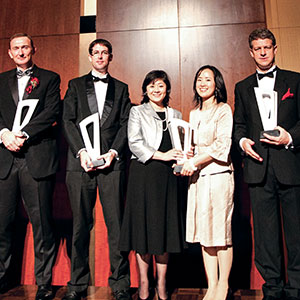PR and English language initiatives needed for ambitious Tokyo 2020 goals
It has been argued that the 1964 Tokyo Olympic and Paralympic Games were the point at which Japan truly began its post-war rehabilitation and, certainly, the city of Tokyo has much to be proud of as a result of the efforts then.
Now it has spanking-new hotels (some of them already renovated, with others to follow suit), an elevated expressway system and the still impressive—even futuristic-looking—Yoyogi National Stadium in Harajuku.
The country at large benefitted, too, with the iconic Shinkansen quickly established internationally as a sign of the country’s thrusting development. Who in the world has not seen the sleek bullet train streaking past a magnificent Mount Fuji?
There is, understandably, a huge sense of excitement and expectation about Japan’s hosting of the 2020 Olympic and Paralympic Games.
The hope is that this will be a renaissance, a chance for the country to regain its self-confidence and haul itself out of the doldrums that have beset it since the economic downturn—which saw Japan slip from the world’s second- to third-largest economy—and the triple disaster of March 2011.
So, Tokyo 2020 is an opportunity certainly, but there is also a fear that this is a PR soufflé on which the oven door is about to be thrown open.
Japan is notoriously bad at its own PR. Perhaps it is a cultural thing; here it’s not exactly done to blow your own trumpet. So be it. But the country also has been loath to embrace others who might be willing to trumpet the nation’s advantages on its behalf.
International PR consultancies have regularly met with fierce resistance. Several years ago, when Japan began a somewhat futile attempt to attract more foreign tourism, officials delighted in their slogan “Yokoso Japan”, apparently oblivious to the fact that, if you didn’t speak Japanese, the phrase was meaningless.
I recall attending one meeting of an advisory committee and pointing that out. I compared the slogan to those of other countries—“Incredible ###”; “### Truly Asia” and “Amazing ###”.
Everyone in the room knew immediately which country each slogan promotes, but there was a complete failure to understand that Japan’s slogan simply could not compete. Deaf ears. “You don’t understand: we Japanese …”.
Ahead of the 2020 Games, Tokyo Governor Yoichi Masuzoe has made the brave boast that he will make his city number one in the world for tourism. I wonder if he realises the enormity of the task he faces; indeed, I wonder if he understands the task itself?
Tokyo is a truly amazing city. It is clean. It is safe. It is efficient. But try getting around if you have zero Japanese language ability, and you will quickly come up against significant barriers. The situation is worse still if you happen to be in a wheelchair.
Try drawing cash from a bank machine. Try taking a taxi to even the best-known spots; not only do the drivers often not know where you want to go, but, if you hail a taxi on the street, they sometimes don’t know where they are.
True, people are generally helpful and polite, but when something like the Games comes to town, there has to be a totally different game plan.
The number of overseas visitors to Japan reportedly reached 10mn in 2013. Tokyo 2020 will see that number rise significantly, and Masuzoe is on record as saying he’d like to see the number rise to 18mn by 2024.
Attracting more tourists is truly a genuine opportunity if it is recognised for what it is. The first thing that needs to be approached is the desperately low level of English language capability across the entire hospitality industry.
Other languages would also be welcome, of course, but we have to be realistic: getting beyond “this is a pen” in English alone will be a real challenge.
The Japanese government will have to accept an increased number of teachers and trainers, and will need to recognise the significant number of non-Japanese already on the ground here who have superior Japanese-language skills compared with the English-language ability of their Japanese counterparts.
The ability of these non-Japanese is an area that is largely ignored because it does not sit comfortably with the wareware-nihonjin-wa set who, by and large, believe that anyone not brought up on a diet of rice and miso soup couldn’t possibly understand anything Japanese.
It is a blind arrogance that has already cost Japan dearly; it would not have been surpassed economically by China had it been quicker to secure English-language skills and, thus, its ability to think globally. It is something the country must confront.
In South Korea, Taiwan, mainland China—not to mention Singapore and Hong Kong—one finds English commonly spoken. There was a time when Japan aspired to that. It is time to aspire again.






